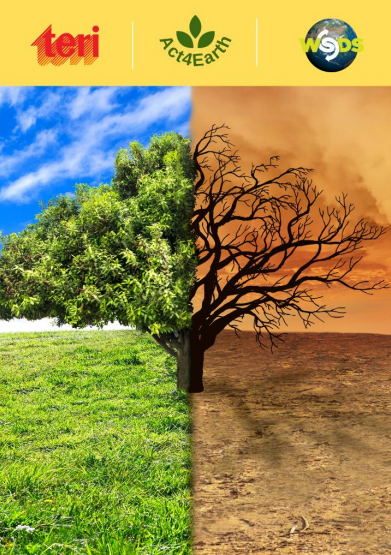TERI Hosts Pre-COP28 Dialogue, Launches Road to Dubai and the Global Goal on Adaptation
New Delhi, November 07, 2023: In the wake of the G20 New Delhi Leaders' Declaration's recent ratification during the G20 Leaders' Summit and the eagerly anticipated COP28 in Dubai, The Energy and Resources Institute (TERI) organized a Dialogue, on Tuesday. The event titled ‘Road to Dubai, from G20 to COP28’ brought together stakeholders to dissect the critical relationship between Sustainable Development Goals (SDGs) and the pressing need for climate action.
Dr Vibha Dhawan, Director General of TERI, delivered the welcome address where she underscored that as we move towards COP28 in Dubai, most of the attention of community outside the negotiating space have been around the principles of mitigation and loss and damage. There needs to be equal focus on adaptation and work towards reaching a concrete outcome on Global Goal on Adaptation (GGA) as mandated by the Paris Agreement on Sustainable Development Goals. “India emerged as an influential voice of the Global South during its G20 presidency and in its remaining term, we should focus on making Lifestyle for Environment (LiFE) a global goal”, she added.
Mr Majid Alnekhailawi, Deputy Chief of Mission, Embassy of UAE, outlined the vision of the COP28 Presidency and delivered his address on the expectations from COP28 calling it a defining moment for cooperative action. Mr Majid focused on the need for energy transitions moving away from fossil fuels and called for an active participation from the global leaders. He also stressed on the need for enhanced climate finance given how the existing assurances had not been fulfilled. Prof. Sachin Chaturvedi (Director General, Research, and Information System for Developing Countries - RIS), highlighted the existing fragmentation in climate finance mechanisms. The event proceeding was chaired by Ambassador Manjeev Puri from TERI.
Other speakers included Mr Laveesh Bhandari, President, Centre for Social and Economic Progress; Ms Jayashree Nandi, Environment Correspondent at Hindustan Times; Ms Archana Choudhary, an environment journalist; Dr Nitya Nanda, Director of the Council for Social Development; Mr Shubhashis Dey, Director of Climate Policy & Climate Finance at Shakti Sustainable Energy Foundation; and Mr Arun Krishnan, Manager at Climate Policy Initiative.
The event saw the launch of the Policy Brief titled, “Road to Dubai and the Global Goal on Adaptation”.
Dr Shailly Kedia, Senior Fellow, TERI, delivered the framing presentation on the policy brief. Key messages from the policy brief include:
- An important outcome of COP28 could be that the global community commits to securing basic universal enablers of adaptation at all scales, for example, universal access to early warning systems.
- IPCC definition of adaptation emphasizes human and natural systems and not countries. A paradigm shift in the climate regime is needed regarding adaptation. In other words, there is a need to revisit the problem statement. While the approach in climate change negotiations will be country-driven, the GGA framework implementation needs to factor in nuances and a disaggregate picture of vulnerability within countries.
- The New Collective Quantified Goal (NCQG), starting from 2025, is currently in the process of discussion; therefore, it must be based on the needs and requirements of the developing countries, especially considering the need to balance between adaptation climate finance and mitigation climate finance. Along with the Global Stocktake (GST), NCQG must also be linked to the GGA framework.
- Means of implementation, such as capacity-building on data systems, are crucial not only for Monitoring, Evaluation, and Learning (MEL) purposes but also to avoid maladaptation. All indicators, including input, output, and outcome indicators, are important.
- GGA should be built on a risk framework in the context of the temperature goals, which recognizes climate impacts. Baselines should consider vulnerability and risks associated with different temperature scenarios.
They delved into various crucial aspects of the climate discourse. The discussions revolved around the undeniable reliance on fossil fuels and the nuanced concept of climate change as both a common and differentiated issue. A key highlight was the role of technology in addressing environmental challenges, especially in the context of the Global South.
The panelists echoed the sentiment that global challenges necessitate global actions and collectively embraced the idea that the future must be shaped through collaborative efforts. They emphasized the importance of democracy in action and shedding liabilities as an urgent requirement.
There was a consensus among the panelists that the distribution of funds for climate change initiatives must be addressed at the upcoming COP28. Ambassador Puri underscored the significance of addressing 'Adaptation' at COP28 for the betterment of our world. The role of intention as a pivotal driver in achieving these goals was thoroughly discussed.
The conversation also touched upon the need for standardized taxonomies, rules, and regulations, as well as the creation of wealth and urbanization as important elements in the fight against climate change. Additionally, there was a suggestion to incentivize adaptors rather than penalizing polluters as a potential approach to explore in the pursuit of a sustainable future.
The dialogue concluded on an information session on the World Sustainable Development Summit (WSDS) 2024, its objectives and the likely contribution it makes in the space.

